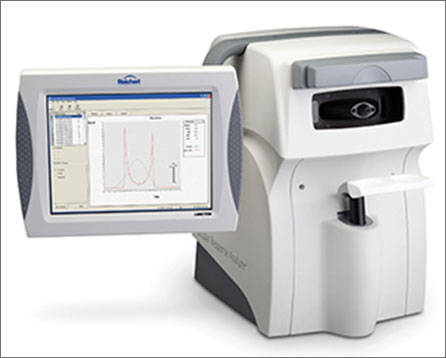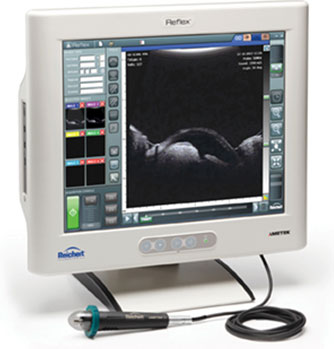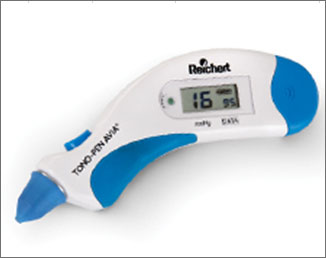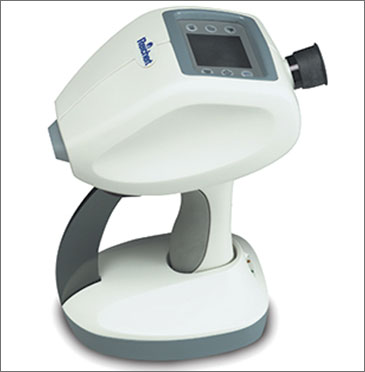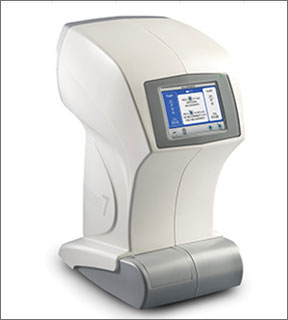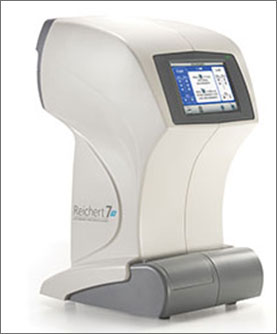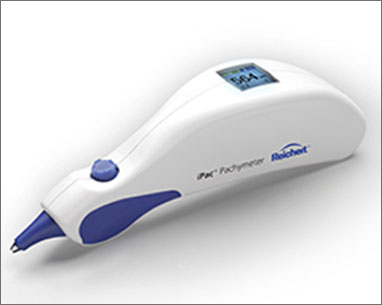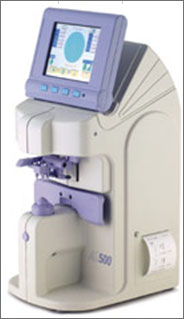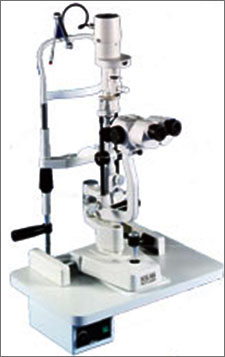|
The Ocular Response Analyzer (ORA) is
the only instrument in the world capable of
measuring Corneal Hysteresis (CH); an
indication of the biomechanical properties
of the cornea. This information is different
from thickness or topography, which are
geometrical attributes of the cornea. CH
represents a tissue
property, which provides more
comprehensive information about ocular
biomechanics. There are over
225 publications about ORA in the
peer-reviewed literature.
The CH measurement provides independent
information that aids in the diagnosis and
management of
glaucoma. In cornea and refractive surgery,
the Ocular Response Analyzer enables
physicians to better
identify eyes at risk of keratoconus.
Finally, corneal biomechanics are what
really influence the accuracy of tonometers.
ORA's ability to measure biomechanical
properties of the cornea enables the device
to provide corneal
compensated IOP, called IOPcc, which has
been proven to be less influenced by corneal
properties than Goldmann or other
methods of tonometry.
Clinical Applications of the Ocular
Response Analyzer:
Glaucoma
The Ocular Hypertension Treatment Study
(OHTS), and similar studies, have brought to
light the relevance
of corneal thickness in glaucoma.
Numerous studies utilizing the Ocular
Response Analyzer have confirmed the
importance of the cornea in glaucoma
decision making, demonstrating that the CH
measurement is of
even greater significance than CCT. Studies
have proven that low CH is independently
associated with glaucoma progression. As
such, the CH measurement gives clinicians a
new tool to help identify risk of
glaucoma progression and to determine
which patients may need to be treated more
aggressively. The
CH measurement has also been shown to be
predictive of IOP response to medical
therapy,making the CH measurement valuable
in setting treatment goals and expectations.
Intraocular Pressure (IOP)
It is widely accepted that the measurement
errors in Goldmann tonometry are due to the
influence of corneal
properties. However it has been
determined that mathematical correction of
IOP, by means of CCT adjustment algorithms,
is invalid and this approach is not useful
in individual patients. Quite simply, the
thickness of the cornea is not a surrogate
for its mechanical bending characteristics.
Ocular Response Analyzer's
Corneal-Compensated Intraocular Pressure (IOPcc)
takes biomechanical properties
into consideration. IOPcc has been
shown to be less dependent on corneal
properties than other methods of tonometry
and more associated with glaucoma status.
The instrument?s unique ability to
simultaneously provide a Goldmann-correlated
IOP measurement (IOPG) and IOPcc provides
clinicians with a better
understanding of patient tonometry
values.
Cornea
The Ocular Response Analyzer enables
clinicians to assess the cornea based on
biomechanical tissue properties, rather than
geometry only. It has been demonstrated that
Corneal Hysteresis (CH) and Corneal
Resistance Factor
(CRF) measurements are significantly lower
in keratoconus patients. Furthermore, CH and
CRF are significantly reduced following
refractive surgery as a result of complex
biomechanical changes. CH and CRF provide a
more complete characterization of corneal
properties than CCT and topography alone,
making these metrics useful in the
pre-operative assessment of refractive
surgery candidates.
What is Corneal Hysteresis?
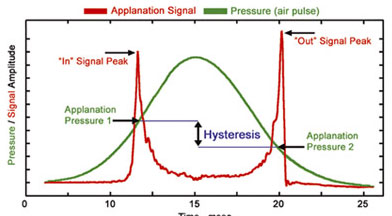
Corneal
Hysteresis (CH) is the difference in the
inward and outward pressure values obtained
during the dynamic bi-directional applanation process employed
by the Ocular Response Analyzer, as a result
of viscous damping in
the cornea. It is a characterization of the
cornea?s energy absorption capacity, which
is a function of the
biomechanical properties of the cornea.
Ocular Response Analyzer is the only
instrument in the world capable of measuring
corneal biomechanical
properties and Corneal Compensated IOP.
How it Works.
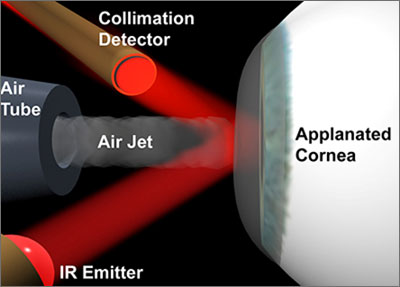
The Ocular
Response Analyzer utilizes a dynamic
bi-directional applanation process to
measure biomechanical
properties of the cornea and the intraocular
pressure of the eye. A precisely metered
collimated air-pulse causes
the cornea to move inwards, past applanation,
and into a slight concavity. Milliseconds
after applanation, as the
air pulse force decreases, the cornea begins
to return to its normal configuration. In
the process, it once again
passes through an applanated state.
An electro-optical system monitors the
curvature of the cornea throughout the
deformation process taking 400
data samples during the 20-millisecond
measurement. Two independent pressure values
are derived from the
inward and outward applanation events.
Viscous damping in the cornea results in an
offset between the inward
and outward pressure values. The difference
between these two pressure values is Corneal
Hysteresis (CH).
Comprehensive Pressure and Cornea
Information
-
IOPcc (Corneal Compensated IOP) - New IOP
measurement less affected by corneal
properties.
-
CH (Corneal Hysteresis) - Measure of viscous
damping in the cornea, providing new
indicators for disease
diagnosis and management.
-
CRF (Corneal Resistance Factor) - Total
visco-elastic response of the cornea.
-
IOPg (Goldmann Correlated IOP) - Traditional
IOP measurement for historical reference.
Advanced Technology
-
Patented dynamic bi-directional applanation
process enables the only direct measure of
corneal biomechanical
properties.
-
Eliminates operator variance by utilizing
microprocessor control technology and
objective measurement criteria.
-
Patient and Operator Friendly
-
No chinrest and a soft, quiet air puff make
the Ocular Response Analyzer a comfortable,
non-intimidating
experience for your patients.
-
Fully automatic alignment and measurement
provides fast, repeatable results, allowing
any member of your
staff to conduct an exam.
Powerful Software Package
-
Enables automatic data capture of all
measurements for analyzing trends, treatment
efficacy, and diurnal
variations.
-
Comprehensive patient management database
simplifies record keeping.
-
Comprehensive printout for hard-copy
results.
-
Export data for use in other applications.
Ocular Response Analyzer: At a Glance
-
Objective measurements - no operator
influence .
-
Comprehensive patient management database.
-
Improved measurement repeatability.
-
Softer, quieter air-puff.
-
2x faster automated alignment and
measurement.
-
Attractive, compact, all-in-one hardware
platform.
-
Flexible product configuration for optimal
space utilization in any office setting.
-
Innovative left / right mounting, 180-degree
rotating, tilting screen.
-
Easy-to-use, integrated 12 inch touch
display.
-
Optional wired keyboard and mouse available.
-
Integrated Keratoconus Match Index (KMI)
software*
-
* 510k pending. Not available in the USA.
-
Optional motorized chinrest
Specifications
Catalog Number -
16070 Ocular Response Analyzer System
16071 Ocular Response Analyzer System with
chinrest
Tonometer -
Measurement Range: 0 - 60 mmHg
Display Resolution: +/- 0.10 mmHg
Note: The accuracy complies with ISO 8612
Tonometer Standard
Electrical -
Voltage: 100 - 240 volts AC 50/60 Hz
Current: 1.5 A
Watts: 40 - 75 VA
Fuses: Slo-Blo(T), 2.5 Amp, 250V, glass
type, 5x20mm
Operating System -
Windows 7® 32-bit, Embedded
Physical Dimensions -
Height: 17.0 inches (43.2 cm)
Width: 9.5 inches (24.1 cm)
Length: 13.5 inches (34.3 cm)
Weight, unpacked: 30 lbs. (13.6 Kg)
Screen: 12.1 inches
|








